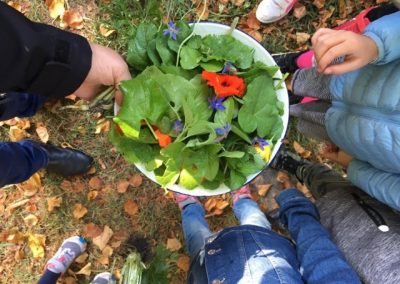Prinzessinnengarten /Nomadisch Grün gGmbH
In 2009 the Prinzessinnengarten was founded at Moritzplatz in Kreuzberg, a community garden and learning place on a former wasteland in the middle of the city. Since the Prinzessinnengarten was designed from the very beginning as a mobile urban garden, Nomadisch Grün – the supporting organization of the Prinzessinnengarten founded in 2009 – has now moved to a new location in Neukölln with its activities after 10 years in Kreuzberg. Here, a new form of community garden is establishing itself on parts of the New St. Jacobi Cemetery, thus supporting the possibility of maintaining this place as a publicly accessible green space.
This new location is very large and close to nature with 7.5 hectares. The community garden is located in the middle of this natural space that has grown for 100 years. The activities are open to everyone and are gladly accepted by the neighbourhood and educational institutions. They range from sowing, planting, harvesting, seed production, processing and preserving vegetables, keeping bees and building a worm compost to questions of community design of urban habitat. Weekly gardening days take place on the raised-bed meadow, in the field and in the greenhouse. At the open garden meeting every week everyone can contribute with their ideas. The main aim of the work here is to provide low-threshold educational and participation opportunities.
Prinzessinnengarten has become an outstanding example of ECS in Berlin by growing vegetables in urban spaces with local communities, focusing on education & participation in order to create appreciation for food and bring people together who co-create liveable urban spaces, thus creating diverse edible landscapes within the city (school gardens, firm gardens, public gardens at social & cultural institutions)
Hence, they’ve gain great experience by bringing people together/community building in open activities with diverse backgrounds & expertise, creating innovative and low threshold concepts for urban green spaces / transforming urban green spaces.
Their networking efforts gather people from different countries and other supporting organisation such as Gardening Network Berlin, as well as local neighbourhoods, who regularly come for an exchange, through volunteering services and educational programmes.
Some of their highlights are the model project implementation for long term conversion of urban green spaces e.g. cemetery, relocation to a new area with a long term perspective and since 2019 first time growing food on a larger scale directly in soil.
There are around 50 people involve in the organisation providing services as low threshold participation & education activities, as well as the transformation if urban spaces into edible landscapes.
- Region: Metropolregion Berlin/Brandenburg
- Country: Germany
- Type: NGO
- Value chain:
Contact:
Hermannstr. 99-105
12051 Berlin
Germany
[ess_grid alias="grid-1"]
Updates für diese Seite an EdiCitNet schicken
Wir freuen uns, wenn du uns Updates für diese Seite per E-Mail schickst.



